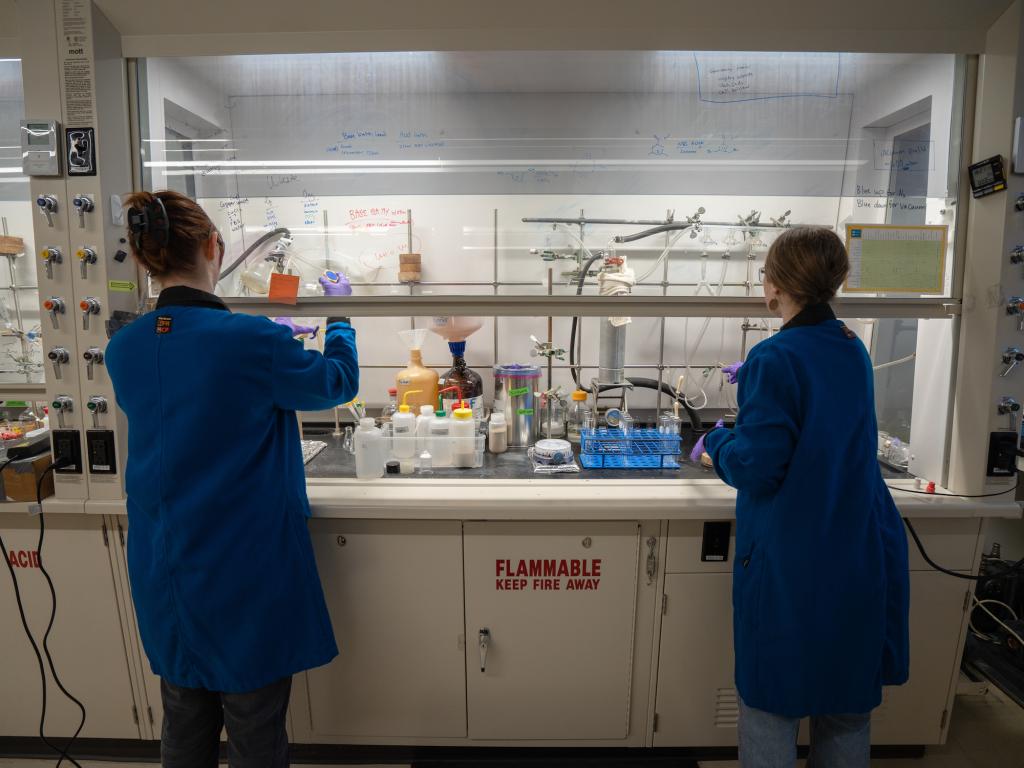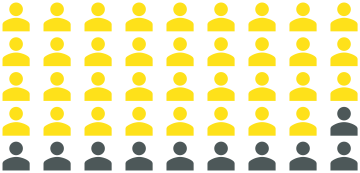
The Presidential Undergraduate Research Scholars (PURS) program at the University of Oregon supports and enhances student engagement in research in the fields of chemistry, physics, computer science, and earth sciences. The program was launched in 2014 through a collaborative effort between Professor of Chemistry and Presidential Chair in Science Geraldine Richmond, and the Undergraduate Research Opportunity Program (UROP) in the Office of the Vice President for Research and Innovation (OVPRI). Richmond, a longtime advocate for broadening participation in science, elected to use the funds from her Presidential Chair in Science position to create the PURS program. Shortly after its inception, Michael Haley, Richard M. & Patricia H. Noyes professor of chemistry, rounded out the leadership team.
The program selects a small cohort of six to seven students each year who demonstrate strong academic potential and intend to enter graduate degree programs. Preference is given to students who come from backgrounds that are historically underrepresented in their disciplines. The selected scholars conduct research in a UO laboratory and participate in a course that provides instruction and training on topics including scholarly writing, research communication, graduate school preparation, and professional development.
Defining success in undergraduate research programs is dependent on the program’s objectives. The goal of the PURS program is to prepare promising undergraduates for graduate education and career success through a combination of financial support and a curriculum focused on career preparation. The initial hope was that the program could serve as a career launch pad for nascent scientists; based on the achievements of program alumni, that goal has been overwhelmingly achieved.
Alumni Achievement
PURS program alumni have been highly successful in entering top graduate programs in the United States, winning nationally competitive fellowships, and entering careers related to their academic and research interests.

Seventy-eight percent of program alumni are currently pursuing graduate education at institutions including University of California, Berkeley; University of California, Irvine; University of Illinois at Urbana-Champaign; Georgia Tech University; Harvard University; the Massachusetts Institute of Technology, University of California, Santa Barbara; Stanford University; Yale University; and Columbia University. The remaining 22% are in research-related careers at organizations such as Thermo Fisher Scientific, Genentech, the Broad Institute, MD Anderson Cancer Center, Nike, and Precision Analytical. Others have co-founded start-ups including Open Climate Fix and Insight Optics.
Of those who pursued graduate education, 22.9% received competitive National Science Foundation Graduate Research Fellowships (NSF GRFP) and an additional 20% received honorable mention. To put that in perspective, the NSF GRFP acceptance rate is approximately 16%.
The PURS program leadership recognizes that the program is not solely responsible for alumni achievements, but when there is close alignment between the intended goals of the program and alumni achievements, it is noteworthy.
The success of program alumni is beneficial in multiple ways. Not only does it demonstrate the value of the program, but alumni are regularly invited to meet with current participants to give journey talks, graduate school insights, and career advancement advice. The participation of alumni in program activities affirms the value of the hard work that current students are putting in, gives them confidence in their ability and identity as scientists, and builds community among generations of scientists coming through the University of Oregon.
“I measure the success of our program in the multitude of successes our PURS alumni experience after ‘graduating’ the program," Haley said. "One of my favorite classes is when we invite back some of the former PURS participants to meet and interact with the current cohort of students. The insight and wisdom the former students offer to the current class is invaluable, plus getting to hear from the former students about what exciting things they are currently doing makes this a rewarding experience for me as an educator.”
Collaboration is Key to Success
The PURS program is unique in a few ways, from its administration to its instructional approach to the design of its curriculum. At the core of these attributes is collaboration. Combining expertise on research excellence and broadening impacts with expertise on experiential learning and undergraduate research program administration, the Richmond Science Group and UROP were able to put together a comprehensive initiative with high-quality content and student services.
The course associated with the PURS program is taught collaboratively by graduate students in the Richmond Science Group and UROP staff, with oversight by Richmond (up until her appointment as the Undersecretary of Science and Innovation at the Department of Energy) and Haley. This instructional approach allows for integration of a variety of topics, from scholarly writing to soft skills development, which would be difficult for one individual to effectively teach. This approach benefits both the undergraduate and graduate students, providing the latter with a unique teaching and mentoring experience.
Scholars leave the program with extensive research experience, a toolkit of research communication skills, an expanded network, and clarification about their career goals with the corollary knowledge and skills to achieve them.
For more information visit the PURS program website. Applications for the 2023-2024 academic year are currently being accepted and are due June 30.
